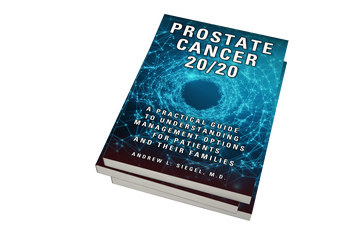Andrew Siegel MD 6/6/2021
OAB is a remarkably common condition causing urinary urgency, frequency (daytime and nighttime) and, at times, urge leakage. The key symptom is urinary urgency, the sudden and strong desire to urinate that is difficult to suppress. Urinary urgency is often a Pavlovian conditioned response that is triggered by exposure to the sight or sound of running water, cold or rainy weather, hand-washing, entering the shower, and getting closer and closer to a bathroom, particularly upon returning home and entering one’s garage, placing the key in the door to one’s home, or entering the bathroom and racing to the toilet.
Although there are many underlying causes, OAB is often due to one’s bladder contracting (squeezing) on its own, without one’s “permission.” Coping strategies include using liners, pads, diapers, mapping out bathrooms in advance, fluid and caffeine restriction, adjusting travel plans, getting an aisle seat on airplanes, wearing dark clothing that is less likely to show wet spots than light clothing, etc.
First line therapies for OAB are behavioral, including moderation of fluid and caffeine intake, urgency suppression through voluntary pelvic floor muscle contractions on demand, bladder training strategies, avoidance of constipation, and healthy lifestyle measures. Second-line therapy is pharmacological management. Gemtesa (Vibegron) is a new medication for OAB that just became available. It is the second medication in its specific medication class, a competitor to Myrbetriq (Mirabegron) that was FDA approved in 2012 and has been an effective medication for many patients with OAB.
Gemtesa is a beta-3 adrenergic receptor agonist that activates beta-3 receptors in the bladder causing relaxation of the smooth muscle of the urinary bladder, increasing the bladder’s storage capacity and helping alleviate urgency and frequency. Gemtesa tablets are taken once daily with or without food and can be swallowed whole with water or crushed and mixed with apple sauce, yogurt, etc., if there are swallowing issues that prevent swallowing the whole pill.
A recent clinical trial demonstrated the following benefits of Gemtesa: 2 fewer daily episodes of incontinence, 2 fewer daily bathroom visits, and 3 fewer daily bathroom visits associated with strong urgency.
The most common side effects in the clinical trial were the following: headache, urinary tract infection, nasal congestion or runny nose, sore throat, diarrhea, nausea and upper respiratory tract infection. These adverse effects occurred in a very small percentage of enrolled patients. Gemtesa had no significant impact on blood pressure.
Gemtesa versus Myrbetriq
- Both once-a day, selective beta-3 adrenergic receptor agonists
- Urovant vs Astellas manufacturers
- Gemtesa 75 mg vs Myrbetriq 25 mg or 50 mg: Gemtesa does not require dose escalation
- Gemtesa crushable vs Myrbetriq that must be swallowed whole: Gemtesa advantageous for swallowing issues
- Gemtesa no impact on blood pressure vs. Myrbetriq that can elevate BP slightly: Gemtesa can be prescribed without concern for blood pressure issues
- Gemtesa is primarily eliminated by the body unchanged and intact vs Myrbetriq metabolized by CYP2D6 and when used concomitantly with other drugs metabolized via the same pathway, adverse interactions may occur: Gemtesa is less likely to cause a drug-drug interaction–the only interaction warning is digoxin (Lanoxin) as opposed to Myrbetriq with interaction warnings for digoxin (Lanoxin), metoprolol (Toprol XL), desipramine (Norpramin), thioridazine (Mellaril), flecainide (Tambocor), propafenone ( Rythmol)
- Gemtesa FDA approved for adults vs Myrbetriq (tablets and granules formulations) FDA approved for adults and for neurogenic OAB (bladder problems caused by neurologic impairment) in children ages 3 years and older: Myrbetriq advantageous for pediatric usage
Bottom Line: Gemtesa is a welcome addition to the overactive bladder pharmacological armamentarium. The beta-3 agonist class of medication has numerous advantages over the anti-cholinergic class (Detrol, Ditropan, VESIcare, Enablex, Sanctura, Toviaz) and Gemtesa affords some advantages over Myrbetriq including simple dosing, ability to crush, no worries about blood pressure and less drug-drug interactions, but has not yet been approved for pediatric indications as has Myrbetriq. Myrbetriq has been an effective medication with a key barrier being cost, so it remains to be seen how the cost issue will pan out for Gemtesa.
Wishing you the best of health,


A new blog is posted weekly. To receive a free subscription with delivery to your email inbox visit the following link and click on “email subscription”: www.HealthDoc13.WordPress.com
Dr. Andrew Siegel is a physician and urological surgeon who is board-certified in urology as well as in female pelvic medicine and reconstructive surgery. He is an Assistant Clinical Professor of Surgery at the Rutgers-New Jersey Medical School and is a Castle Connolly Top Doctor New York Metro Area, Inside Jersey Top Doctor and Inside Jersey Top Doctor for Women’s Health. His mission is to “bridge the gap” between the public and the medical community. He is a urologist at New Jersey Urology, the largest urology practice in the United States. He is the co-founder of PelvicRx and Private Gym. His latest book is Prostate Cancer 20/20: A Practical Guide to Understanding Management Options for Patients and Their Families.

Video trailer for Prostate Cancer 20/20
Preview of Prostate Cancer 20/20
Andrew Siegel MD Amazon author page
PROSTATE CANCER 20/20 is now available at Audible, iTunes and Amazon as an audiobook read by the author (just over 6 hours).
Dr. Siegel’s other books:
PROMISCUOUS EATING— Understanding and Ending Our Self-Destructive Relationship with Food
MALE PELVIC FITNESS: Optimizing Sexual and Urinary Health
THE KEGEL FIX: Recharging Female Pelvic, Sexual, and Urinary Health
Tags: Andrew Siegel MD, beta-3 agonist, Gemtesa, overactive bladder, urgency, urgency urinary incontinence, urinary incontinence

June 5, 2021 at 9:42 AM |
Dr Siegel, Do you think I’m a candidate for Gemtesa and that it would work for me? Your Patient, Justin DiCioccio 917.513.1309
Sent from my iPad
>
June 6, 2021 at 6:35 AM |
Certainly worth a try, when you are next in office I will provide samples.